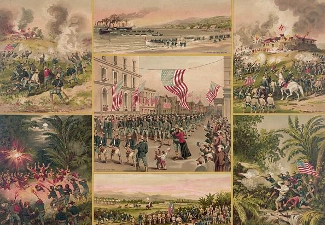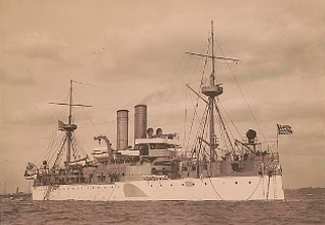
Lithograph of various scenes of the Spanish-American War, Date/Artist Unknown. Courtesy Library of Congress.
Spanish-American War Timeline - Major Battles
For three months and three weeks in 1898, the United States battled Spain in a war that effectively ended the Spanish Empire while simultaneously establishing a position in the Caribbean and the Pacific for the United States colonial empire. Yes, we kinda have and had one. There had been three years of fighting by Cuban revolutionaries for independence, an attack of the U.S. Maine, and ambitions to oust the Spanish from the New World that prompted it. By the end, after the Treaty of Paris of 1898 ended the war, the United States had ersatz control, in one form or the other, over Cuba, Puerto Rico, Hawaii (coup leading to annexation), Guam, and the Philippines. The Philippines were purchased for $20 million.
-
1898
-
To the 1890's
Sponsor this page for $150 per year. Your banner or text ad can fill the space above.
Click here to Sponsor the page and how to reserve your ad.
-
Battle Timeline

1898
February 15, 1898 - Sinking of Battleship Maine, Havana, Cuba
Troops: USA 355; Spain NA.
Casualties (Killed/Wounded/Missing): USA 261 killed, 78 wounded; Spain 0.
Mysterious sinking of warship during the Cuban revolution, but prior to the beginning of the Spanish-American War. Prompted, by April 25, after diplomatic efforts for Spain to cede Cuba to the United States failed, a declaration of war by both sides.
May 1, 1898 - Battle of Manila Bay, Philippines
Troops: USA 9 ships; Spain 13 ships, 6 shores batteries, 3 forts.
Casualties (Killed/Wounded/Missing): USA 10; Spain 348, 8 ships sunk.
First major battle of war ends with the Spanish fleet in the Philippines destroyed by Admiral Dewey's U.S. naval force and the end of Spanish colonial rule in the Philippines after Dewey landed the Marines at Cavite one day later.
May 12, 1898 - First Battle of San Juan, Puerto Rico
Troops: USA 10 ships; Spain 2 ships, 2,500 infantry.
Casualties (Killed/Wounded/Missing): USA 9; Spain 63, including 23 civilians.
Bombardment of two Spanish forts, Fort San Cristobal and Castillo San Felipe del Morro, in San Juan by U.S. warships leads to damage of forts in first major action of Puerto Rican campaign. There would be two subsequent battles for San Juan on June 22 and 28 during the American blockade of the port.
June 6-10, 1898 - Battle of Guantanamo Bay, Cuba
Troops: USA/Allis 923; Spain 5,000.
Casualties (Killed/Wounded/Missing): USA/Allies 29; Spain 208 plus 18 captured.
Victory by American and Cuban forces in battle to establish a naval base in Cuba leads to subsequent victories at Santiago and San Juan.
June 24, 1898 - Battle of Las Guasimas, Santiaga, Cuba
Troops: USA/Allis 1,764; Spain 1,500.
Casualties (Killed/Wounded/Missing): USA/Allies 79; Spain 21.
First land battle of war occurs when Spanish attack the advancing columns of Major General Joe Wheeler in jungles around Santiago. Considered a USA victory, because the Spanish continued to withdraw, although they repulsed two frontal assaults.
July 1, 1898 - Battle of El Caney, Santiago, Cuba
Troops: USA/Allies 8,653; Spain 620.
Casualties (Killed/Wounded/Missing): USA/Allies 441; Spain 176, 160 captured.
Inconclusive battle against the southwest flank of Spanish defenses of Santiago as Spain held off advancing troops for twelve hours, preventing reinforcement to San Juan Hill.
July 1, 1898 - Battle of San Juan Hill, Santiago, Cuba
Troops: USA/Allies 11,412; Spain 521-800.
Casualties (Killed/Wounded/Missing): USA/Allies 1,095-3,024 depending on source; Spain 228, plus 39 captured.
Difficult battle to capture the San Juan Heights with future President Theodore Roosevelt leading the Rough Riders and the African-American troops of the Buffalo Soldiers engaged in heavy action. Battle led to United States victory despite heavy casualties.
July 3, 1898 - Battle of Santiago de Cuba
Troops: USA 8 ships; Spain 6 ships.
Casualties (Killed/Wounded/Missing): USA 2; Spain 474 plus 1,720 captured.
Decisive American victory in naval battle effectively gives Cuba its independence from Spanish rule when Spanish fleet is destroyed. Would lead to the Siege of Santiago and the end of the war.
July 3-17, 1898 - Siege of Santiago, Cuba
Troops: USA/Allis 17-19,000; Spain 13,500.
Casualties (Killed/Wounded/Missing): USA/Allies 1,614; Spain 2,000, plus 11,500 captured.
Last major battle in Spanish-American War in Cuba when Fifth Corps of United States sieges the city instead of assaulting. Two week event leads to surrender of the city.
August 8-9, 1898 - Battle of Fajardo, Puerto Rico
Troops: USA NA; Spain NA.
Casualties (Killed/Wounded/Missing): USA 46; Spain 58.
Battle near end of war leads to American withdrawal from their position at the Cape San Juan lighthouse. Action was considered inconclusive.
August 13, 1898 - Battle of Manila, Philippines
Troops: USA 10,700, Philippine Revolutionaires 30,000; Spain 13,000.
Casualties (Killed/Wounded/Missing): USA 6; Spain 49.
Considered a mock battle with secretly planned conflict to give Manila to the Americans and not the Philippine Revolutionaries. Would lead to Philippine American War in 1899.
Minute Walk in History
With video from Thomas Edison of the war against Spain in Cuba and the Philippines, and vibrant musical background, get as close a glimpse to the conflict in 1898 as possible, started off by the sinking of the USS Maine. Troops off to war, the Roughriders and Teddy Roosevelt, and shots fired.
Full Text, Treaty of Peace Between the United States and Spain; December 10, 1898
The United States of America and Her Majesty the Queen Regent of Spain, in the name of her august son Don Alfonso XIII, desiring to end the state of war now existing between the two countries, have for that purpose appointed as plenipotentiaries:
The President of the United States, William R. Day, Cushman K. Davis, William P. Frye, George Gray, and Whitelaw Reid, citizens of the United States;
And Her Majesty the Queen Regent of Spain,
Don Eugenio Montero Rios, president of the senate, Don Buenaventura de Abarzuza, senator of the Kingdom and ex-minister of the Crown; Don Jose de Garnica, deputy of the Cortes and associate justice of the supreme court; Don Wenceslao Ramirez de Villa-Urrutia, envoy extraordinary and minister plenipotentiary at Brussels, and Don Rafael Cerero, general of division;
Who, having assembled in Paris, and having exchanged their full powers, which were found to be in due and proper form, have, after discussion of the matters before them, agreed upon the following articles:
Article I. - Spain relinquishes all claim of sovereignty over and title to Cuba. And as the island is, upon its evacuation by Spain, to be occupied by the United States, the United States will, so long as such occupation shall last, assume and discharge the obligations that may under international law result from the fact of its occupation, for the protection of life and property.
Article II. - Spain cedes to the United States the island of Porto Rico and other islands now under Spanish sovereignty in the West Indies, and the island of Guam in the Marianas or Ladrones.
Article III. - Spain cedes to the United States the archipelago known as the Philippine Islands, and comprehending the islands lying within the following line:
A line running from west to east along or near the twentieth parallel of north latitude, and through the middle of the navigable channel of Bachi, from the one hundred and eighteenth (118th) to the one hundred and twenty-seventh (127th) degree meridian of longitude east of Greenwich, thence along the one hundred and twenty seventh (127th) degree meridian of longitude east of Greenwich to the parallel of four degrees and forty five minutes (4 [degree symbol] 45']) north latitude, thence along the parallel of four degrees and forty five minutes (4 [degree symbol] 45') north latitude to its intersection with the meridian of longitude one hundred and nineteen degrees and thirty five minutes (119 [degree symbol] 35') east of Greenwich, thence along the meridian of longitude one hundred and nineteen degrees and thirty five minutes (119 [degree symbol] 35') east of Greenwich to the parallel of latitude seven degrees and forty minutes (7 [degree symbol] 40') north, thence along the parallel of latitude of seven degrees and forty minutes (7 [degree symbol] 40') north to its intersection with the one hundred and sixteenth (116th) degree meridian of longitude east of Greenwich, thence by a direct line to the intersection of the tenth (10th) degree parallel of north latitude with the one hundred and eighteenth (118th) degree meridian of longitude east of Greenwich, and thence along the one hundred and eighteenth (118th) degree meridian of longitude east of Greenwich to the point of beginning.The United States will pay to Spain the sum of twenty million dollars ($20,000,000) within three months after the exchange of the ratifications of the present treaty.
Article IV. - The United States will, for the term of ten years from the date of the exchange of the ratifications of the present treaty, admit Spanish ships and merchandise to the ports of the Philippine Islands on the same terms as ships and merchandise of the United States.
Article V. - The United States will, upon the signature of the present treaty, send back to Spain, at its own cost, the Spanish soldiers taken as prisoners of war on the capture of Manila by the American forces. The arms of the soldiers in question shall be restored to them.




